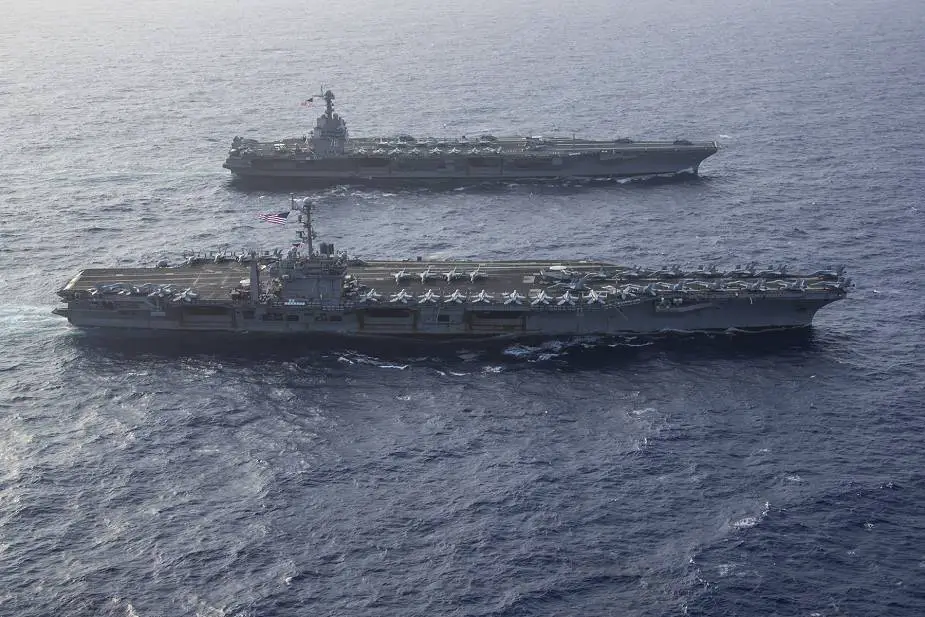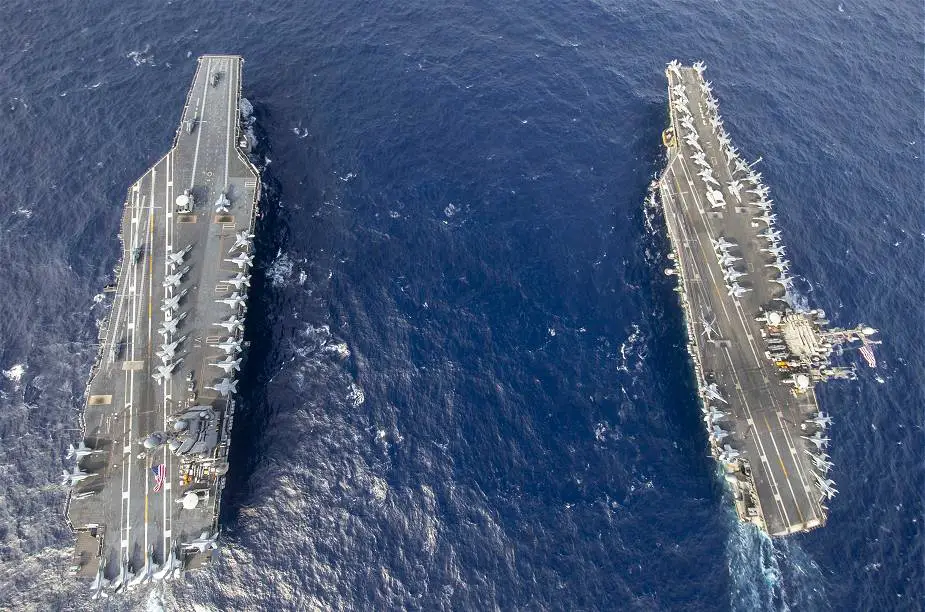On June 4, 2020, U.S. Navy has released pictures showing a Ford-class and Nimitz- class aircraft carrier together on the sea. The Ford-class aircraft carrier USS Gerald R. Ford (CVN 78) and the Nimitz-class aircraft carrier USS Harry S. Truman (CVN 75) transit the Atlantic Ocean, June 4, 2020, marking the first time a Ford-class and a Nimitz-class aircraft carrier have operated together underway.
Follow Navy Recognition on Google News at this link
 The USS Harry S. Truman CVN 75 Nimitz-Class aircraft carrier (front on the image) operates for the first time at sea with USS Gerald R. Ford (CVN-78) Ford-Class aircraft carrier. (Picture source U.S. Navy)
The USS Harry S. Truman CVN 75 Nimitz-Class aircraft carrier (front on the image) operates for the first time at sea with USS Gerald R. Ford (CVN-78) Ford-Class aircraft carrier. (Picture source U.S. Navy)
Gerald R. Ford is underway conducting integrated air wing operations, and the Harry S. Truman Carrier Strike Group remains at sea in the Atlantic as a certified carrier strike group force ready for tasking in order to protect the crew from the risks posed by COVID-19, following their successful deployment to the U.S. 5th and 6th Fleet areas of operation.
The USS Gerald R. Ford (CVN-78) is the lead ship of her class of United States Navy aircraft carriers. The construction of CVN-78 began in August 2005 and she was laid down in November 2009. It was officially commissioned in July 2017. On August 207, It has performed its first sea trials known as Builder's Sea Trials (BST). Builder's sea trials provide an opportunity to test systems, components and compartments at sea for the first time.
The Gerald R. Ford (CVN-78) class carrier design is the successor to the Nimitz-class carrier design. The Ford-class design uses the basic Nimitz-class hull form but incorporates several improvements, including features permitting the ship to generate more aircraft sorties per day, more electrical power for supporting ship systems, and features permitting the ship to be operated by several hundred fewer sailors than a Nimitz class ship, reducing 50-year life-cycle operating and support (O&S) costs.
Gerald R. Ford is equipped with an AN/SPY-3 and AN/SPY-4 active electronically scanned array multi-function radar,[58] and an island that is shorter in length and 20 feet (6.1 m) taller than that of the Nimitz class; it is set 140 feet (43 m) further aft and 3 feet (0.91 m) closer to the edge of the ship. Replacing traditional steam catapults, the Electromagnetic Aircraft Launch System (EMALS) will launch all carrier aircraft.
June 2, 2020, U.S. Navy has announced the largest air wing embark to date (CVW-8), and Ford’s first ordnance movement from a lower deck magazine to F/A-18E Super Hornets using Ford’s state-of-the-art Advanced Weapons Elevators during a teleconference, June 1, 2020. CVW-8 embarked seven squadrons and is operating nearly 30 fixed-wing aircraft and both of their Helicopter Sea Combat squadrons. Cummings said this embark serves as an opportunity to stress and test Ford’s unique design and demonstrate her ability to conduct integrated air wing operations.
USS Gerald R. Ford (CVN 78) is the first new design for an aircraft carrier since USS Nimitz (CVN 68). The ship is equipped with two newly-designed reactors and has 250 percent more electrical capacity than previous carriers. The improvements will allow the ship to load weapons and launch aircraft faster than ever before.

The Ford-class aircraft carrier USS Gerald R. Ford (CVN 78) and the Nimitz-class aircraft carrier USS Harry S. Truman (CVN 75) transit the Atlantic Ocean, June 4, 2020, marking the first time a Ford-class and a Nimitz-class aircraft carrier operated together underway. (Picture source U.S. Navy)
The U.S. USS Harry S. Truman (CVN-75) is the eighth Nimitz-class aircraft carrier of the United States Navy, it was launched on 7 September 1996 by Newport News Shipbuilding, Newport News, Virginia, and commissioned on 25 July 1998 with Captain Thomas Otterbein in command.
The Harry S. Truman is 333 m (1,092 feet) long, 78 m (257 feet) wide and is as high as a twenty-four-story building, at 74 m (244 feet). The aircraft carrier can accommodate approximately 90 aircraft and has a flight deck 1.8 ha (4.5 acres) in size, using four elevators that are 360 m2(3,880 sq ft) each to move planes between the flight deck and the hangar bay. With a combat load, HST displaces almost 97,000 tons and can accommodate 6,250 crew members.
Two Westinghouse A4W nuclear reactors are used for propulsion, this means that the ship is capable of steaming more than three million miles before refueling. The ship has 4 five-bladed propellers that weigh 30.04 t) (66,220 pounds) each and can drive the ship at speeds over 56 km/h (30 knots - 35 mph).
The U.S. USS Harry S. Truman is armed with two Mk 57 Mod3 Sea Sparrow ship-borne short-range anti-aircraft and anti-missile weapon systems, two RIM-116 Rolling Airframe Missile lightweight infrared homing surface-to-air missile and three Phalanx CIWS, a close-in weapon system for defense against airborne threats such as anti-ship missiles and helicopters.
As of January 2020, USS Harry S. Truman is deployed in the U.S. 5th Fleet area of operations to support maritime security in the Middle East



